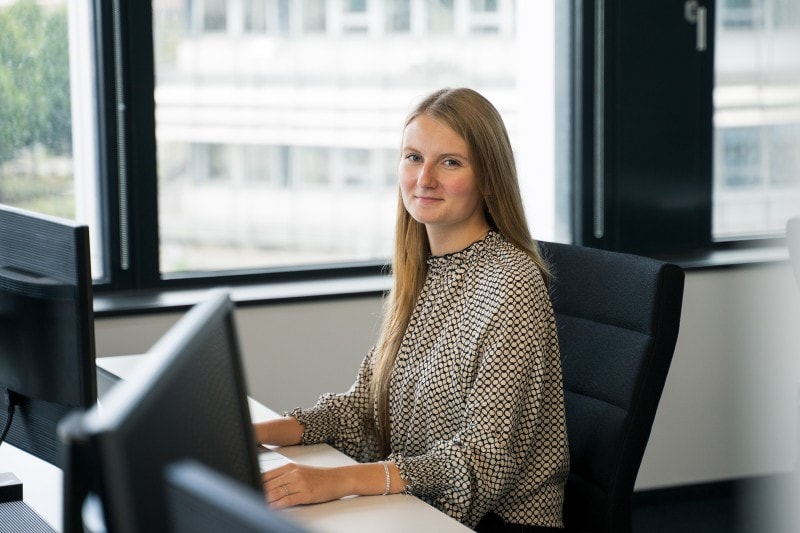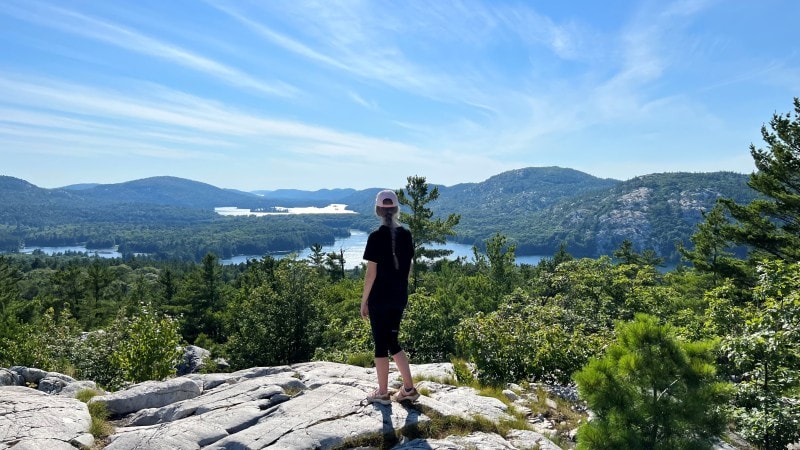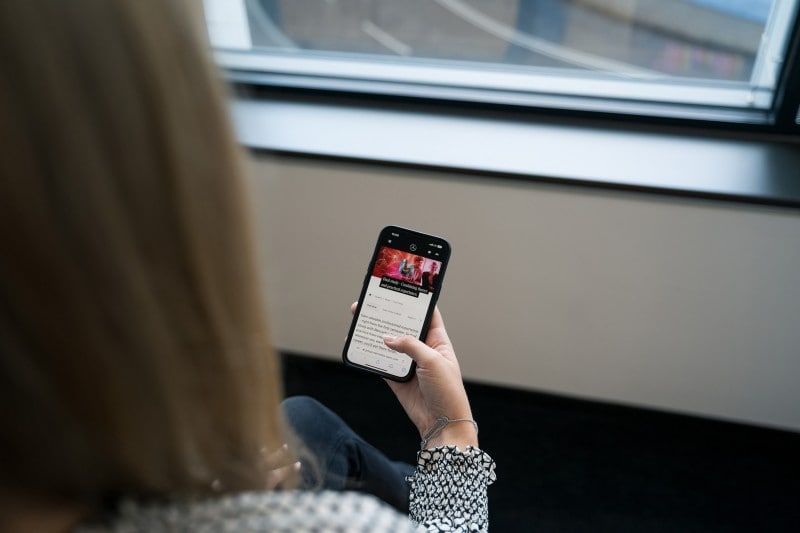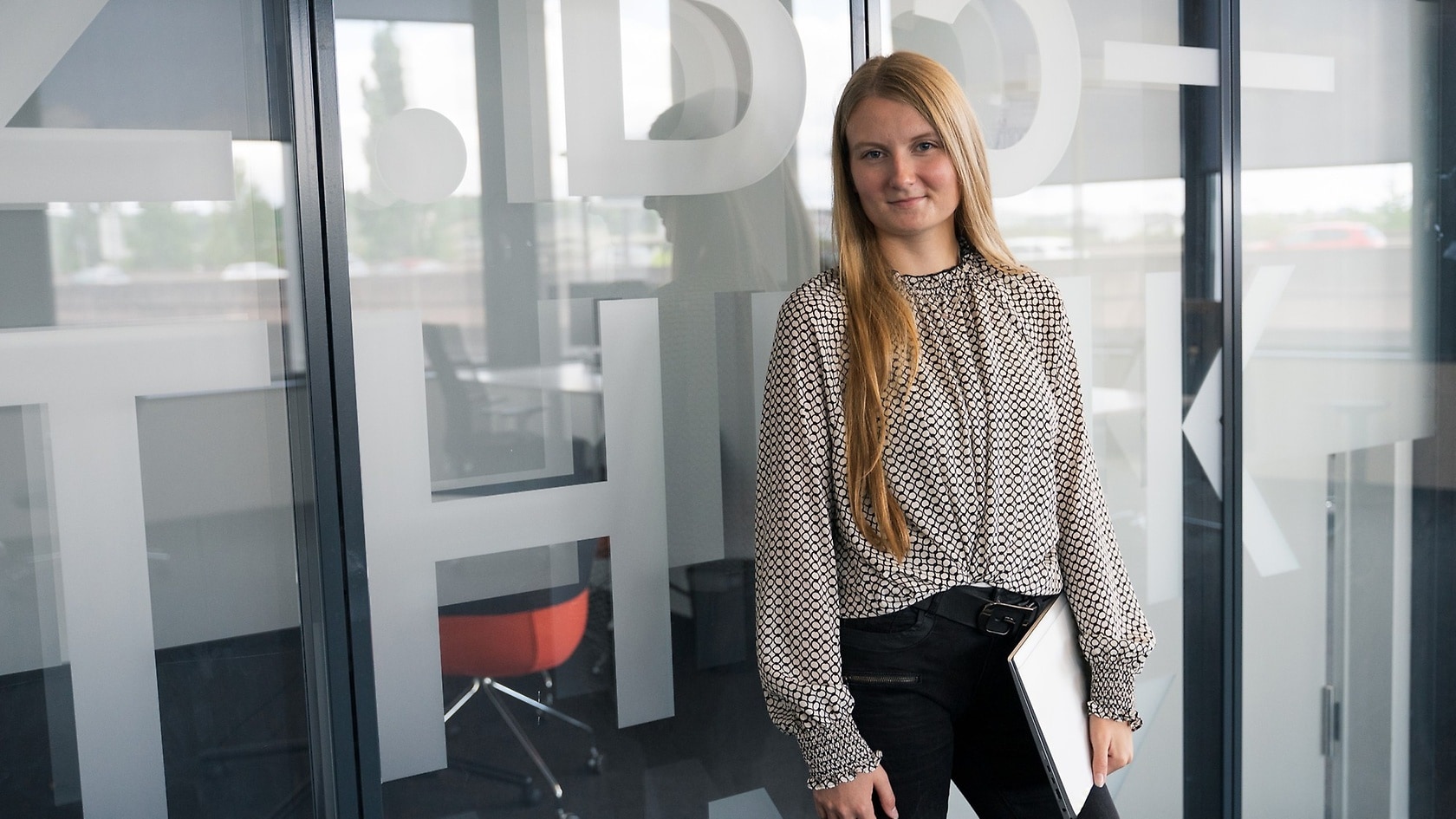"The perfect combination of business informatics, data science and creativity".
Lea Mayer is passionate about the potential that lies within data and the many possibilities to visualise it. This is exactly what the dual student is currently learning in her business informatics studies with a focus on data science, and she has already learned what it means to have project responsibility. In her first four semesters, she gathered experience in a range of projects both at the university and in the company. During her international assignment Lea was also working on her own use case. In her interview, she tells us what creativity has to do with data and what experiences she has acquired through theory and practice.
Hi, Lea! You are currently in the fifth semester of your dual business informatics studies. What makes this course of studies so exciting for you?
It is really amazing how you can generate knowledge from data. During my studies, I was introduced to lots of different tools for leveraging this potential from the data. The combination of business and computer science allows the results of data analyses to be interpreted in a business context and support actual decision-making processes. Prior to my studies, I had a vague idea of what data science was, but it was a real eye-opener to learn all about the possibilities that lie behind this and see how much fun it is to use a data set to derive recommendations for action in a business context. That's really cool.

Your favourite subject areas are data visualisation, data mining and machine learning. Why these three areas in particular?
Studying business informatics allowed me to combine my interests in business administration and IT. But at the beginning, I had no idea that this course of studies would also allow me to indulge my passion for artistic creativity. These three favourite subject areas of mine showed me that creativity also plays a major role in my dual studies program. Data visualisation, for example, is all about representing different data records in such a way that the viewer can easily identify the core message. This involves a creative aspect that I never expected before I started. Data mining and machine learning are tools for deriving knowledge from data. I love developing different machine learning models, letting the algorithms run and then seeing how this process generates a genuinely useful forecast.
You have already had the chance to put your knowledge to the test in a number of projects. Which project did you find particularly memorable?
Oh, there are a few [laughs]. I spent my second practical assignment with Smart Logistics and UI (user interaction) at Mercedes-Benz, where, among other things, apps used for documenting disruptions in logistical material and information flows are developed for the global production environment. Optimal app development requires input from both sides – developers and production employees alike. As a business informatics specialist, I acted as the interface between these two parties. Within the team itself, I supported the product owner of these apps. In meetings with system administrators from the plant, we learned about the kinds of problems they might be experiencing with an app, what changes might be necessary or how a particular workflow could be simplified. So for the developers, we acted as the points of contact for clarifying all matters relating to the app functions: What should changes look like? How should the function respond? I really enjoyed this aspect of project management. Business data processing specialists are ideal for this position because they possess both technical and business knowledge and also have a direct link to the company.
Let's stay on the subject of the practical phase. You are currently working in the field of data science and engineering. What are your tasks during this assignment?
I'm spending this semester in a team which is developing an app that makes it easier to generate machine learning models and analyse the results. This tool allows prediction models to be easily adapted in line with various data and business units in order to generate accurate forecasts. The prediction of trends, for example, is intended to provide employees in the field of finance with a range of financial key figures. My task here is to optimise a machine learning algorithm so that the predictions are as accurate as possible. This is an extremely important aspect in data science because if users don't trust the results of an analysis or forecast, they won't factor the results into their day-to-day business decisions. This subject area is so exciting that I'm even writing a scientific paper on this at the Baden-Württemberg Cooperative State University, with a view to discovering how we can drive the development of a data-driven decision-making culture.

You have experienced everyday working life not only in Germany, but also in Canada. What experiences did you gain during your three months at the Digital House in Toronto? What was your main task during your time there?
Seeing an organisation in a completely different market is really exciting! The Digital House in Toronto is a small but dedicated team responsible for all of Mercedes-Benz Canada's digital activities and channels. The team that I was working for focuses on everything to do with the website, e-commerce and the Mercedes me App. One of the areas that I was supporting was the Data House. The Data House is responsible for various data-driven projects within Mercedes-Benz Canada. A range of dashboards keep the various business units up to date with the latest key figures, for example. Previously, the data was taken from tables and then prepared in graphical form. My job was to transfer the data to a business analysis program. In this role, I acted as an interface with the business units and therefore, I was able to reflect the business requirements in the visualisation.
Toronto was your second experience abroad after your semester in Birmingham, UK. What new, enriching insights did you gain during your stay in the UK?
In Birmingham, I was a "full-time" student for the first time ever. As a dual student, I'm constantly switching between theory at the university of cooperative education and practice at Mercedes-Benz, a model that I really appreciate. But at Aston University in Birmingham, I was able to experience a more typical student life. And in such a multicultural community, this was truly unique. Thanks to the Erasmus program, I gained insights into the English education system and got to experience new cultures. It was definitely worth it.

What tips or advice do you have for pupils interested in a dual studies program?
Get your application in early! My suggestion is to submit all the relevant documents as soon as the application phase begins, which is in June the year before. And my second piece of advice is to make sure that you properly inform yourself in advance of what the course of studies involves, what it's about exactly and what kind of content you can expect. This helped me to better appreciate the possibilities offered by a dual-studies program, and I can't wait for my future tasks. The university open days helped me to gain a detailed insight into the content of the study courses. I had the opportunity to ask students lots of questions and hear first-hand what they have learned. A vast range of online offerings is also available. At the open day last year, for example, I was invited to take part in an online event and, in a series of video calls, answer questions posed by pupils about the dual-studies program.
Do you need to have prior knowledge of IT and data science in order to apply for this course of studies?
At school, I focused on economics and also studied computer science, so this gave me some clue about all the specialist terms that came up during my studies. Some of my fellow students, however, had attended a school for economics or had focused on computer science. Compared with them, I was a student with relatively little previous knowledge. In the beginning, I was also worried that I wouldn't be able to keep up with computer science at all. But you don't have to worry about that. You learn everything from scratch and if you're dedicated and show a certain affinity towards the subject, you'll have no trouble grasping the content. We started out as a group of thirty students and help each other a lot. We are all pulling together and working towards the same goal. That's why it's such a nice atmosphere for me.
And finally, one more question: If you could meet one historical person from the past, who would it be, and what would you want to talk about with this person?
I'd love to meet Bertha Benz. As a child, I remember when my dad and I picked up a Mercedes and I learned all about the history of Mercedes-Benz. I was especially intrigued by the story of Bertha Benz, because she was the one responsible for the company's breakthrough. I'd like to talk to her about what motivated her and to find out what she would tell women today who want to become successful. A truly powerful woman in the automotive industry!
The path that Lea Mayer has embarked upon with her dual business informatics studies is exactly the one that the 20-year-old wanted. This highly varied dual-studies program gives Lea the opportunity to indulge her interests and talents and to demonstrate her newly acquired knowledge in different projects. In her free time, she likes to express her artistic talents: Designing greetings cards is one of her favourite hobbies. Lea's interest in sport also began at a very early age. She has been doing ballet since she was four, a pursuit that provides a good balance to her day-to-day study routine. Lea's choice of dual-studies program is a perfect fit for the thematic field that she later wants to specialise in professionally. So the Stuttgart-born student has no need for a career "plan B", but if she were to pursue a completely different career, then it would be as a wedding planner, which would allow her to combine business administration, management and creativity in whole new ways.




